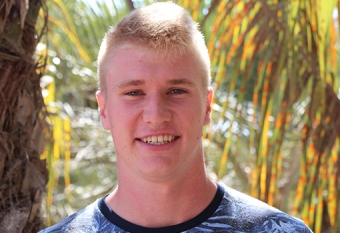
Jordan Finzel, a third-year PhD student in the Chemical Engineering Department, has been awarded a prestigious fellowship from the U.S. Department of Energy (DOE). He was among seventy-eight graduate students from across the nation selected for the DOE’s Office of Science Graduate Student Research (SCGSR) program. Awardees receive supplemental funding and an opportunity to advance their doctoral research and training by conducting research at a DOE laboratory. Students work on research projects that are of significant importance to the Office of Science, because they address societal challenges at the national and international scale.
“DOE has long been where the nation turns for scientific solutions to complex challenges, and now more than ever we need to invest in a diverse, talented pipeline of scientists, engineers, and entrepreneurs who can continue this legacy of excellence,” said Secretary of Energy Jennifer M. Granholm in a DOE news release. “I’m thrilled that these outstanding students will help us tackle mission-critical research at our labs, and I can’t wait to see what their futures hold.”
Finzel will work with Simon Bare’s group at the SLAC National Accelerator Lab in Menlo Park, California. Bare serves as co-director of the Chemistry and Catalysis Division at the lab’s Stanford Synchrotron Radiation Lightsource (SSRL).
“I am honored and humbled to be selected for this program,” said Finzel, who is advised by associate professor of chemical engineering Phillip Christopher. “I’m very excited to learn from and work with some tremendously talented and creative individuals.”
Finzel works on the design of catalysts, which are materials that help facilitate a chemical reaction. Converting oil to gasoline, and turning natural gas and nitrogen into fertilizer are just two important processes in everyday life that rely on catalysis. Finzel’s project focuses on how to design catalysts to be more selective, thereby reducing waste and promoting responsible use of raw materials. Specifically, he is examing the direct conversion of methane, found in natural gas, to liquid methanol, which is a chemical building block used in many industrial processes. Despite being a topic of interest to the research community for decades, there is currently no feasible way to conduct this reaction at scale. At SLAC, Finzel will work with high energy x-ray sources, produced by a synchrotron, to observe the atomic-level structure of catalysts. Similar to how doctors use x-rays to look at the human body, Finzel will use them to probe the structure of various catalyst materials.
“With this understanding, we can engineer catalysts to have desirable properties and facilitate reactions of interest,” said Finzel, who previously received a prestigious Graduate Research Fellowship from the National Science Foundation. “If adequate catalytic technologies were available to directly convert methane to methanol at scale, it could reduce greenhouse gas production and result in efficient energy harvesting and improve carbon management.”
Two additional UCSB graduate students received SCGSR fellowships. Jayden Plumb, who is co-advised by mechanical engineering professor Sam Daly and materials professor Stephen Wilson, will conduct his research at the Argonne National Laboratory, located just outside of Chicago, Illinois. Erin Yandel, a PhD student in physics at UCSB, also received an SCGSR fellowship to conduct research at the Fermi National Accelerator Laboratory in Batalvia, Illinois.
Awardees were selected from a diverse pool of graduate applications based on merit peer review by external scientific experts. Since 2014, the SCGSR program has provided more than seven hundred graduate students with supplemental funds to conduct part of their research at a host DOE laboratory in collaboration with a DOE laboratory scientist.



